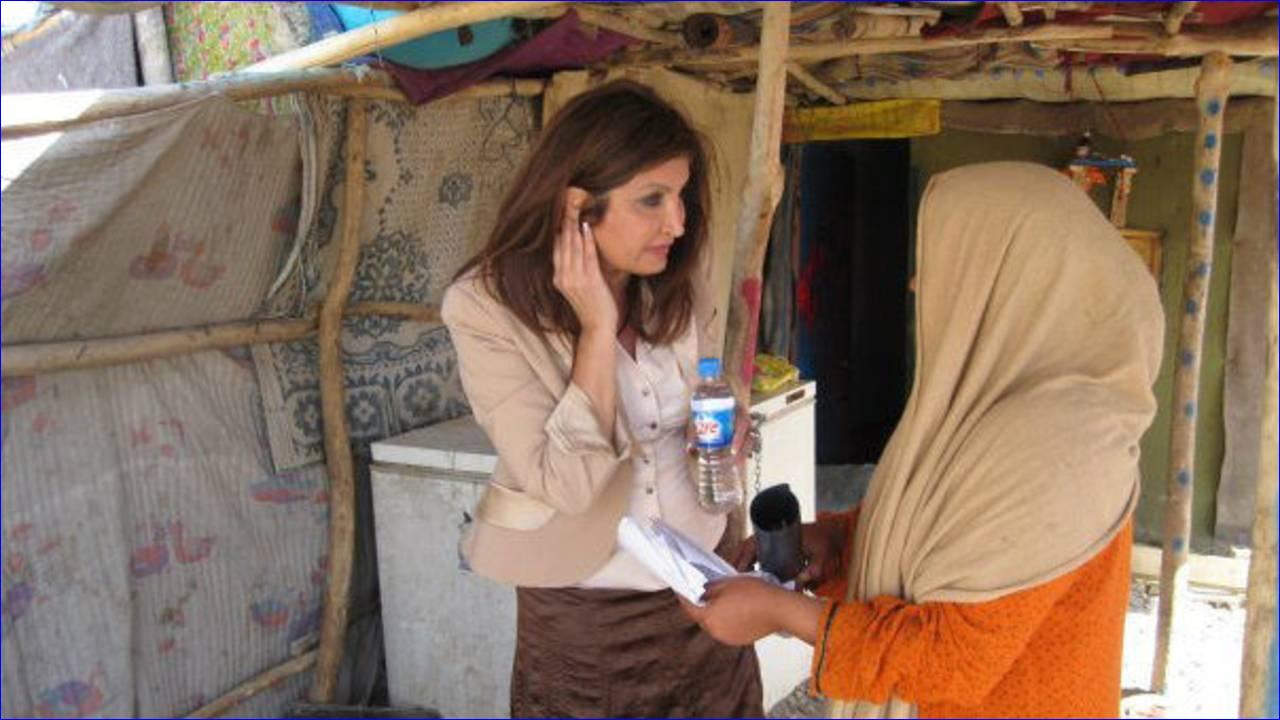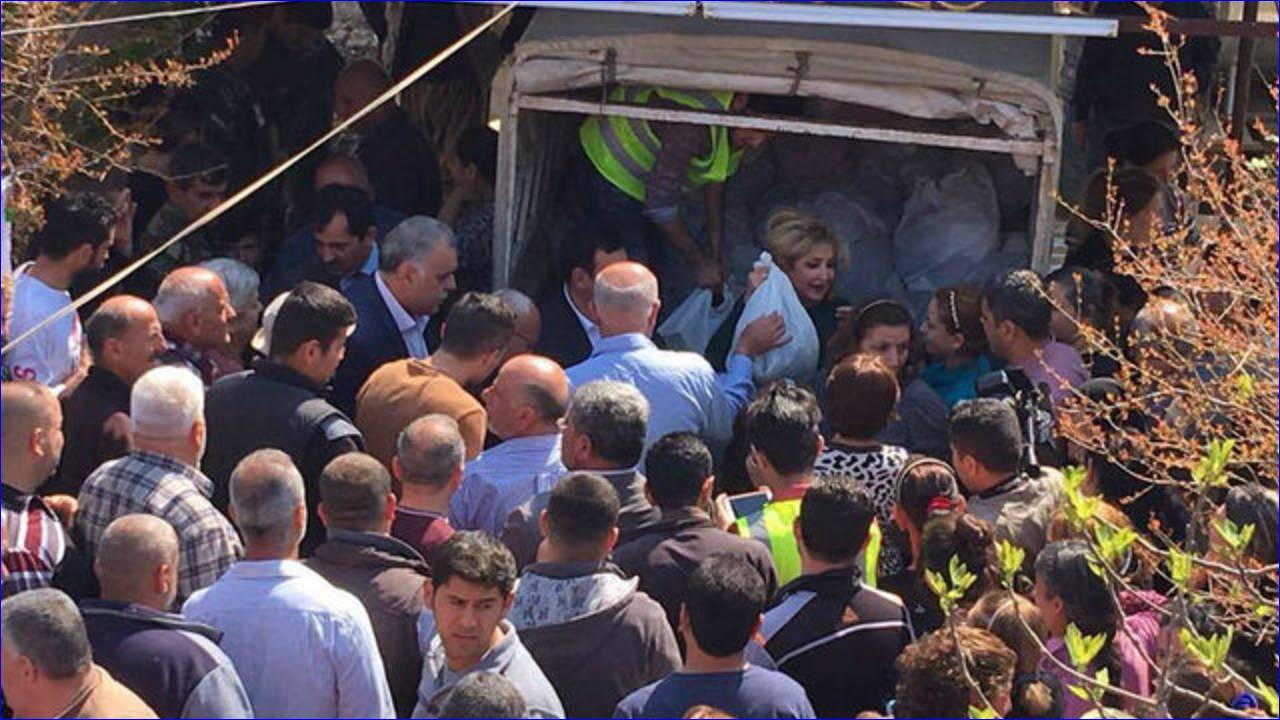


A few short years later, in 2007, the pharmacist went on her first humanitarian trip to Iraq, with the mission of helping victims of war.
Since then, Garmo has made 20 humanitarian trips to Iraq and started the nonprofit One World Medical Mission, an organization providing relief to Middle East communities.
Her latest humanitarian trip to Iraq was in October, spanning a whole month. There was more aid to deliver than usual on the trip.
This time around, she had two containers of humanitarian aid with $665,000 worth of medical supplies to deliver to 11 hospitals in Kurdistan and Mosul, Iraq's second-largest city.
Each container usually carries between $300,000 to $500,000 worth of supplies and is the size of a semi-truck.
For more than a decade, Garmo has delivered at least one to two containers filled with supplies on each humanitarian mission.
"This is only one trip. Imagine what 20 trips have done," Garmo said.
Garmo helps coordinate getting the supplies together for the containers, which are packaged and boxed up in Metro Detroit and make their way to Turkey before finally reaching Iraq.
Risking it all to help Iraqis
In 2014, the Islamic State gained a stronghold in Mosul, giving the remaining Christians in the northern province the ultimatum to flee their homeland, die or pay a special tax.
Garmo made a visit to Iraq that same year to deliver supplies to victims of the crisis. Four years later, with the occupation of Mosul over, she visited the city on this trip.
"I did go to the more dangerous places on this trip. I went to Mosul. That is a place I am not even supposed to go. I took a chance. Mosul was occupied by ISIS for four years," said Garmo.
She walked around the churches and buildings that were destroyed by ISIS during the Fall of Mosul.
She said there were still bodies underneath all the waste and rubble. Garmo saw backpacks and sneakers scattered across the ground.

"I smelled the dead bodies, so I started crying," she said.
Only days after leaving, tragedy struck in that very same spot, where the stench of bodies could be traced.
"I found out five days after I left Mosul that a grenade exploded and killed three children in the same spot I was in," she said.
"I don't get scared. The Iraqis, they protect me. They love me."
The dangers associated with the humanitarian trips are without question worth the risk, Garmo said.
She provides aid that is crucial to the survival of Iraqis who otherwise wouldn't have access to it. To witness the difference she is making and stop is not an option.
The hospitals she visited on this trip lacked medical and surgical supplies.
"These hospitals were in need. How can they treat people when they have no supplies? So, the hospitals got a lot of our supplies and now they can help people. They can operate on people because they finally have the surgical supplies," she said.
Hailed as a 'hero' by Iraqis
Garmo is Chaldean. Chaldeans are Iraqi Catholics. Metro Detroit is home to the largest concentration in the world outside Iraq, with an estimated 160,000 Chaldeans residing in the region, according to the Chaldean Community Foundation.
Garmo is widely known as a compassionate humanitarian in Metro Detroit's Chaldean community and abroad to Iraqis who hail her as a hero.
Garmo said Iraqis have called her "mom" and "doctor Nidhal."
"They tell me, we wish you were our prime minister of health in Iraq," she said.
Garmo has helped Iraqis of all backgrounds and religious sects.
"I look at it like you are a human being. Jesus did not say only help Christians. You see the poor, you help the poorest. You see the sick, you help the sickest. How can you see a person who does not have legs or arms and ask me if this is a Christian, Muslim or Yazidi? It hurts me," she said.
Garmo was born in Iraq and came to the United States in 1980. She studied to become a pharmacist at Wayne State University in Detroit.
She has won more about two dozen awards for her humanitarian work.
"This is why God gave me a degree, so I can go back and help my people," she said. "It is an amazing feeling. I am blessed."
Even long before the Iraq War, Garmo felt she had a calling to become a humanitarian. She remembers watching conflict abroad erupt and becoming devastated.
She knew deep down inside that one day she would help victims of war.
Finding purpose in life through humanitarian work
Garmo's role as a humanitarian has brought purpose to her life.
"I feel like this is a part of my life. It is the most important part of my life. I am delivering. When you deliver you do not stop," she said.
"I feel like there is meaning to my life now. It changed my life."
Garmo has witnessed the devastating toll of the war on Iraqis firsthand.
"You see all these people who lost legs. If you see their reports you will not be able to sleep at night," Garmo said. "You are seeing so much blood and body parts."
Garmo uses social media to help spread awareness on the plight of Iraqis. Many of the videos she posts help capture the situation facing victims of war back home.
Garmo has also made humanitarian trips to Honduras and Jordan to help refugees of the ongoing Syrian crisis.
Many Iraqis complain the quality of life has deteriorated since the start of the Iraq War.
"Many of the people I helped on this trip are young college students and were bombed. A lot of these people had good homes, good jobs. They came from wealthy families, and now you see them begging in the streets," she said.
Being a businesswoman and humanitarian is challenging.
"My back hurts and I have serious knee problems," said Garmo. "You know what, I am still alive. I am still surviving and that is all that matters."
She used to own three pharmacies, and has one pharmacy now.
Managing three pharmacies and working as a humanitarian was too difficult. She had to choose between the two.
"I had to choose between running three pharmacies and my charity. I couldn't manage three pharmacies doing this type of work. Of course, I am happier with my decision," Garmo said.
Witnessing the devastation abroad has made her think differently about things.
"Being a businesswoman, I don't buy expensive stuff for myself.
I don't care for materialistic things at all. I know three purses can bring one child back. I know where that money can go," she said.
Iraqis await humanitarian's return
Besides medical supplies, Garmo has delivered medicine, clothes, diapers, hygiene products and thousands of walkers and wheelchairs among other items to internally displaced Iraqis and Syrian refugees.
"There are no jobs. There is no money for going to the doctor or for people to rebuild their homes. The health sector is worse than ever. There are so many people with congenital diseases and cancer. They have to die. That is because they don't have money and they are lacking a good education," Garmo said.
She managed to build a dental clinic in Iraq which needs support in order remain open.
Garmo frequently receives messages from Iraqis requesting help. This is why many Iraqis are already awaiting her next visit.
However, her resources are limited and helping everyone just is not possible.
"For some people, even if I cannot deliver, they will understand. Sometimes, I don't have enough. They don't get mad. They are patient. They love me to death. If I can't this time, there is next time. For all the people I could not reach because I didn't have enough, I am still going on humanitarian missions. We are still here. We still have wheelchairs. We still have a lot of supplies," she said.
She is not sure when her next humanitarian trip will happen. That depends on when she raises enough money.
Garmo has not always been able to raise enough money and used her own at times.
"That is the only way, and I wish I didn't have to do that, but it is the only way," Garmo said.
Even as much as a quarter can go a long way in Iraq, she explained.
"I witnessed a girl buying a sandwich for 22 cents. If each person donates a dollar, you can buy four sandwiches," Garmo said.
Garmo's passion for humanitarian work appears to be stronger than ever.
"I believe no one will stop me in my mission, because when you do this for the world, we just need to care without expecting anything back, and God will make it continue," she said.
To learn more about One World Medical Mission, click here.

or register to post a comment.